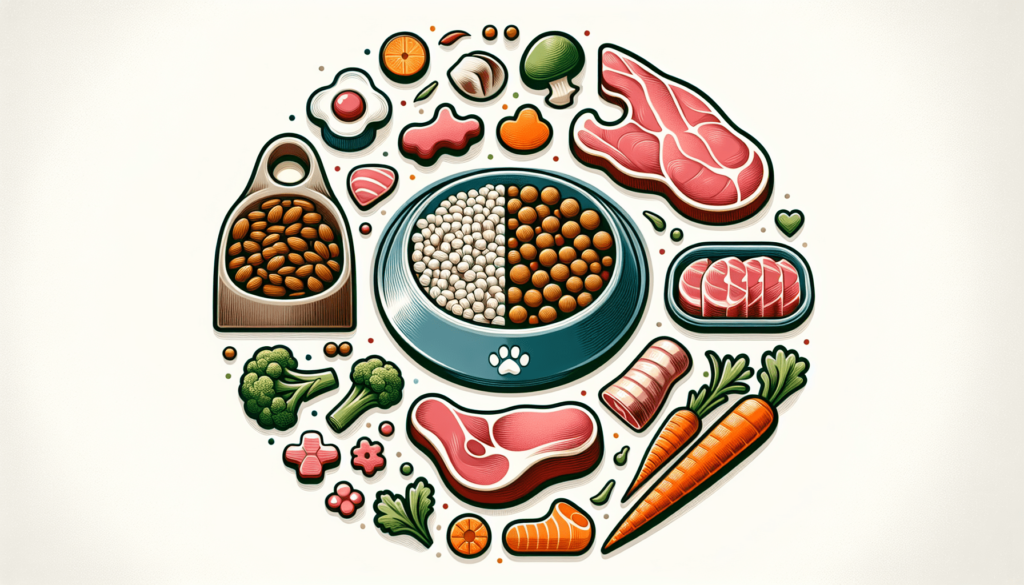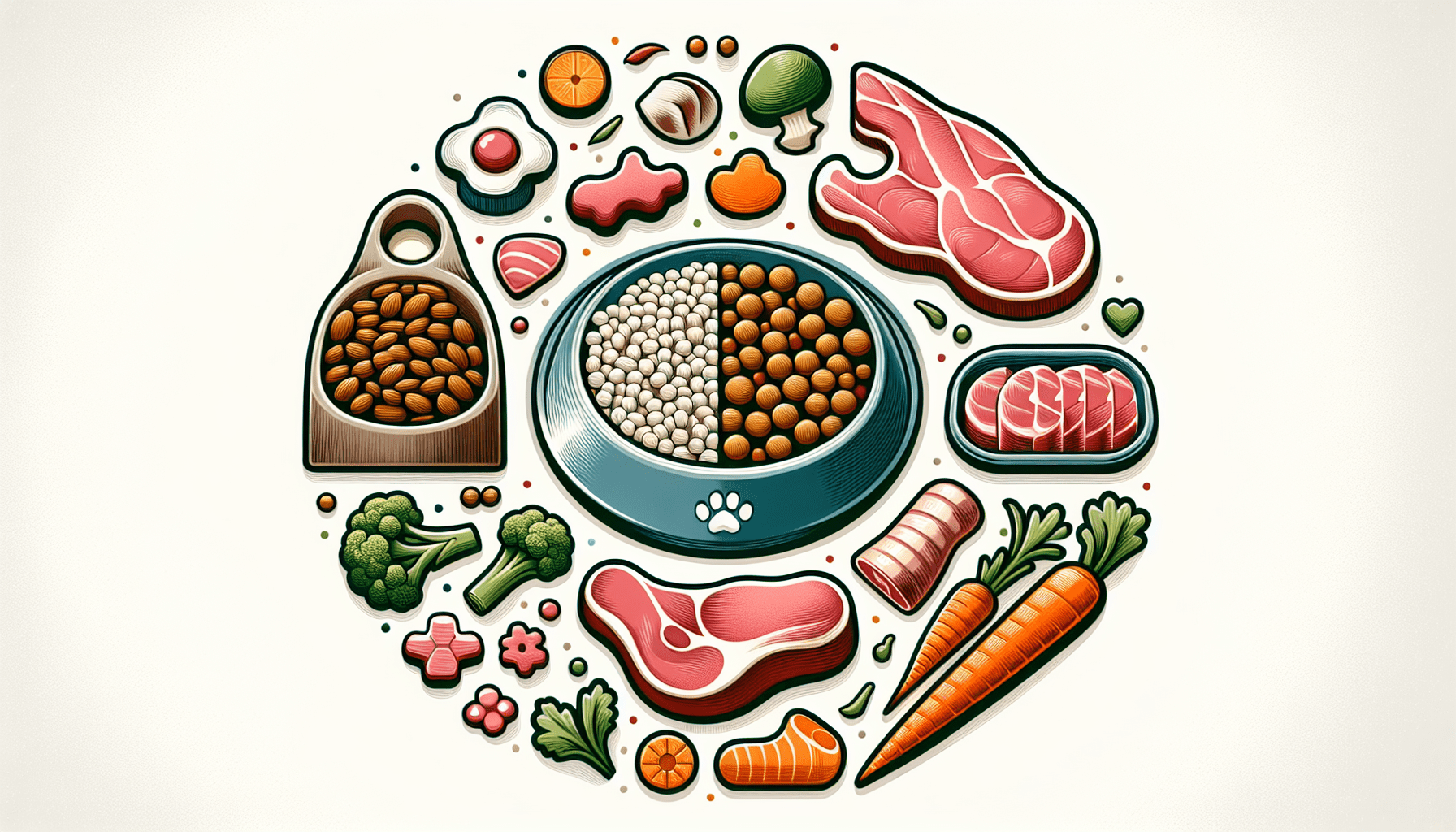If you’ve ever been unsure about what to feed your furry friend, this article is for you. “Understanding Your Dog’s Nutritional Needs” is here to shed light on the importance of proper nutrition for your four-legged companion. From the essential nutrients they require to the potential health issues that can arise from a poor diet, this article will equip you with the knowledge needed to provide the best food for your dog. So grab a treat for your pup and get ready to dive into the world of canine nutrition!
Importance of Proper Nutrition
Proper nutrition is essential for your dog’s overall health and well-being. Just like humans, dogs require a balanced diet to thrive and live a long, healthy life. A nutritious diet provides them with the necessary energy, vitamins, and minerals to support their bodily functions.
Overall health and well-being
Feeding your dog a balanced diet ensures their overall health and well-being. Proper nutrition helps to maintain a healthy weight, which is crucial in preventing obesity and related health issues. It also supports a strong immune system, making your dog more resistant to diseases and infections. Additionally, a well-nourished dog has better mental clarity and is more alert and responsive.
Healthy growth and development
Proper nutrition is especially important during your dog’s growth and development stages. Puppies require a diet that is rich in nutrients to support their rapid growth. Nutrients such as protein, calcium, and phosphorus are necessary for healthy bone and muscle development. Feeding them a properly balanced diet during this stage sets them up for a healthy adulthood.
Prevention of diseases and conditions
A diet that meets your dog’s nutritional needs plays a crucial role in preventing various diseases and conditions. Dogs with a balanced, nutrient-rich diet are less likely to develop common health issues such as heart disease, diabetes, and joint problems. Certain vitamins and minerals, like antioxidants and omega-3 fatty acids, have been found to reduce the risk of certain cancers and support overall health.
Different Stages of a Dog’s Life
Understanding the different stages of a dog’s life is essential when it comes to meeting their nutritional needs.
Puppyhood
During the puppyhood stage, your furry friend experiences rapid growth and development. Puppies require more calories, protein, and essential nutrients to fuel their growth. A diet formulated specifically for puppies should be rich in high-quality proteins to support muscle development and calcium for strong bones. Feeding them smaller, more frequent meals throughout the day is recommended to aid in digestion and prevent hypoglycemia.
Adult years
Once your dog reaches adulthood, their nutritional needs change. Adult dogs require a balanced diet that provides them with the necessary nutrients to maintain their weight and overall health. High-quality protein sources, healthy fats, and a variety of fruits and vegetables can help meet their nutritional needs. The portion size should be adjusted based on the dog’s size, breed, and activity level to avoid overfeeding or underfeeding.
Senior years
As dogs age, their metabolism slows down, and they may become less active. Senior dogs have different nutritional needs compared to puppies and adult dogs. Their diet should focus on maintaining a healthy weight and supporting joint health. Providing them with a diet that is rich in antioxidants, vitamins, and minerals is important for supporting their immune system. Senior-specific dog foods are available that are specially formulated to cater to their specific needs.

Essential Nutrients for Dogs
To provide your dog with a balanced diet, it is important to understand the essential nutrients they require.
Protein
Protein is vital for dogs as it provides the building blocks for healthy muscles, tissues, and organs. High-quality sources of protein, such as chicken, beef, and fish, should be included in your dog’s diet. The amount of protein required may vary based on the dog’s activity level, age, and overall health.
Carbohydrates
Carbohydrates provide the necessary energy for your dog to stay active and maintain a healthy weight. Good sources of carbohydrates for dogs include whole grains, vegetables, and fruits. It is important to choose carbohydrates that are easily digestible and provide essential nutrients.
Fats
Healthy fats, such as omega-3 and omega-6 fatty acids, are important for your dog’s skin, coat, and overall health. Fats provide a concentrated source of energy and aid in the absorption of fat-soluble vitamins. Sources of healthy fats include fish oil, flaxseed oil, and chicken fat.
Vitamins
Dogs need a wide range of vitamins to support their various bodily functions. These include vitamins A, D, E, and K, as well as B vitamins. A balanced diet that includes a variety of fruits, vegetables, and quality dog food should provide the necessary vitamins.
Minerals
Minerals play a crucial role in maintaining a healthy body. Essential minerals for dogs include calcium, phosphorus, potassium, and sodium. These minerals are important for supporting bone health, nerve function, and fluid balance. A balanced diet that includes quality dog food and supplements if necessary should provide these minerals.
Water
Water is essential for your dog’s overall health and well-being. It helps regulate body temperature, aids in digestion, and helps flush toxins out of the body. Always ensure that your dog has access to clean, fresh water at all times.
Special Considerations for Breed and Size
The nutritional needs of dogs can vary based on their breed and size. It is important to consider these factors when choosing the right diet for your furry friend.
Small dogs
Small breed dogs have faster metabolisms and higher energy requirements compared to larger breeds. They require a diet that is specially formulated to meet their specific needs. Small breed dog foods are designed to provide the appropriate calorie content and nutrient profile for their size. Additionally, small dogs may require smaller kibble sizes to promote proper chewing and digestion.
Medium-sized dogs
Medium-sized dogs, such as Border Collies and Cocker Spaniels, have moderate energy requirements. They generally do well on a balanced diet formulated for adult dogs. However, it is important to adjust portion sizes based on their activity level and individual needs.
Large dogs
Large breed dogs, such as Labrador Retrievers and German Shepherds, have slower metabolisms and are prone to certain health issues. They require a diet that is lower in calories and contains controlled amounts of minerals to support their growth and joint health. Large breed-specific dog foods are available and should be considered for optimal nutrition.
Giant breed dogs
Giant breed dogs, such as Great Danes and Mastiffs, grow at a rapid rate and are prone to orthopedic issues. Special care should be taken with their nutrition to support their growth and minimize the risk of developmental disorders. Giant breed-specific dog foods are formulated to provide the appropriate nutrient profile and controlled calorie content.

Identifying Food Sensitivities and Allergies
Just like humans, dogs can develop food sensitivities and allergies. It is important to be able to identify the signs and take appropriate action.
Common symptoms
Symptoms of food allergies or sensitivities in dogs may include itchy skin, excessive scratching, gastrointestinal issues like diarrhea or vomiting, ear infections, and chronic gas. If you notice these symptoms after feeding your dog a specific food, it may be an indication of a sensitivity or allergy.
Elimination diets
If you suspect that your dog has a food sensitivity or allergy, an elimination diet can help you identify the culprit ingredient. This involves feeding your dog a diet consisting of novel protein and carbohydrate sources for a few weeks, then gradually reintroducing individual ingredients to monitor for any adverse reactions. Keeping a diary of your dog’s symptoms and diet can help in the process of elimination.
Consulting with a veterinarian
If you suspect that your dog has a food allergy or sensitivity, it is important to consult with a veterinarian. They can help guide you through the elimination diet process, recommend appropriate tests, and provide suitable alternatives to meet your dog’s nutritional needs.
Choosing the Right Dog Food
Choosing the right dog food is crucial in meeting your dog’s nutritional needs and ensuring their overall health and well-being.
Reading and understanding labels
When choosing dog food, it is important to read and understand the labels. Look for a statement from the Association of American Feed Control Officials (AAFCO) stating that the food meets their nutritional guidelines. Also, check for a specific named meat or meat meal as the first ingredient, as well as a balance of other essential nutrients.
Quality ingredients
High-quality ingredients are essential in providing your dog with optimal nutrition. Look for dog foods that contain whole meats, vegetables, and fruits as these provide important nutrients. Avoid foods that list generic “meat” or “meat by-products” as their main ingredient, as these can be of lower quality. Additionally, avoid dog foods that contain fillers, artificial preservatives, and additives.
Avoiding fillers and additives
Fillers such as corn, wheat, and soy are often used to bulk up dog food but provide little nutritional value. These ingredients can be difficult for dogs to digest and may contribute to food sensitivities or allergies. Avoid dog foods that contain these fillers and opt for ones that use whole grains or grain alternatives.
Consideration of dog’s specific needs
Consider your dog’s specific needs when choosing a dog food. Factors such as age, breed, size, and activity level should be taken into account. Puppies, adult dogs, and senior dogs each have different nutritional requirements. Additionally, dogs with particular health conditions may benefit from specialized diets. Consult with your veterinarian for guidance in choosing the right food for your dog.
Homemade vs. Commercial Dog Food
The debate between homemade and commercial dog food has been ongoing. Both options have benefits and drawbacks that should be considered.
Benefits and drawbacks of each
Homemade dog food allows you to have full control over the ingredients and quality of the food. You can cater to any specific dietary needs or restrictions your dog may have. However, creating a nutritionally balanced homemade diet can be challenging and requires careful planning and supplementation.
Commercial dog food, on the other hand, is convenient and formulated to meet the nutritional needs of dogs. Reputable dog food brands conduct extensive research and testing to create diets that provide optimal nutrition. However, not all commercial dog foods are created equal, and there can be variations in quality and ingredient sourcing.
Proper nutrition in homemade diets
If you choose to feed your dog a homemade diet, it is important to ensure that it is nutritionally balanced. Consult with a veterinary nutritionist or a veterinarian to create a recipe that meets your dog’s specific nutritional requirements. They can guide you on the proper proportions of protein, carbohydrates, fats, and essential nutrients.
Ensuring balance in commercial diets
When feeding your dog commercial dog food, it is important to choose a high-quality brand that meets their nutritional needs. Look for dog foods that use real meats and whole ingredients rather than fillers and additives. Consider rotating between different flavors and formulations to provide variety in your dog’s diet. If your dog has specific dietary restrictions or health conditions, consult with your veterinarian to choose the appropriate commercial diet.
Consultation with a veterinary nutritionist
Feeding your dog a homemade diet or navigating the world of commercial dog food can be overwhelming. If you have concerns or specific dietary requirements for your dog, consider consulting with a veterinary nutritionist. They can help you create a homemade diet plan or recommend specific commercial diets that meet your dog’s nutritional needs.
Feeding Schedule and Portion Control
Establishing a proper feeding schedule and portion control is important for maintaining your dog’s weight and overall health.
Frequency of meals
Puppies require more frequent meals compared to adult dogs. They should be fed three to four times a day to ensure they receive the necessary nutrients for growth. Adult dogs typically do well with two meals a day, while senior dogs may benefit from smaller and more frequent meals to aid digestion.
Recommended portion sizes
The recommended portion sizes for your dog depend on factors such as age, size, breed, and activity level. Follow the guidelines provided on the dog food packaging as a starting point. Monitor your dog’s weight and body condition, and adjust portion sizes accordingly. It is important to avoid overfeeding, as excess weight can lead to various health issues.
Adjusting for age and activity level
As your dog ages or becomes more or less active, their nutritional needs may change. Adjust their portion sizes and feeding schedule accordingly. Older dogs may require less food due to their decreased metabolism, while highly active dogs may need more calories to support their energy levels. Keep an eye on your dog’s weight and consult with your veterinarian if you have any concerns.
Introducing New Foods and Treats
Introducing new foods and treats to your dog’s diet should be done slowly and with caution.
Slow and gradual introduction
When introducing a new food or treat to your dog, it is important to do it slowly and gradually. Start by mixing a small amount of the new food with their current food and gradually increase the proportion over several days. This helps to prevent digestive upset and allows your dog’s system to adjust to the new ingredient.
Monitoring for adverse reactions
Keep an eye on your dog for any adverse reactions when introducing new foods or treats. This includes monitoring for any signs of gastrointestinal upset, allergic reactions, or changes in behavior. If you notice any negative reactions, discontinue the new food or treat and consult with your veterinarian.
Healthy treat options
Treats are great for training, rewarding good behavior, or simply to show your dog some love. However, it is important to choose healthy options that contribute to their overall nutrition. Look for treats that are made with high-quality ingredients and avoid those that contain fillers, artificial flavors, and preservatives. Healthy treat options include fruits, vegetables, and specially formulated dog treats that are designed to meet nutritional needs.
Signs of Nutritional Imbalances
Keeping an eye out for signs of nutritional imbalances is important to ensure that your dog’s diet is meeting their needs.
Weight gain or loss
Sudden weight gain or loss can be a sign of a nutritional imbalance. Obesity or being underweight can both have detrimental effects on your dog’s health. Regularly monitor your dog’s weight and body condition, and adjust their diet accordingly. Consult with your veterinarian if you notice significant changes in their weight.
Dull coat or skin issues
A dog’s coat and skin reflect their overall health and nutrition. A dull coat, dry or flaky skin, excessive shedding, or skin irritations can be signs of nutritional deficiencies. Ensuring that your dog’s diet is rich in essential fatty acids, vitamins, and minerals can help improve their coat and skin health.
Digestive problems
Digestive issues such as diarrhea, vomiting, or excessive gas can be indicators of a nutritional imbalance or food sensitivity. If your dog is experiencing persistent digestive problems, consult with your veterinarian to identify the cause and make any necessary dietary adjustments.
Lack of energy
A lack of energy or lethargy can be a sign that your dog’s diet is not providing them with the appropriate nutrients. Proper nutrition plays a key role in maintaining energy levels and overall vitality. If you notice a significant decrease in your dog’s energy, consult with your veterinarian to ensure their nutritional needs are being met.
Behavioral changes
Nutritional imbalances can also impact your dog’s behavior. Changes in their mood, irritability, or excessive hyperactivity may be linked to their diet. Ensuring a well-balanced diet can help support your dog’s mental well-being and help maintain a calm and balanced temperament.
In conclusion, proper nutrition is essential for your dog’s overall health and well-being. Understanding their different life stages, essential nutrients, breed and size considerations, and signs of nutritional imbalances can help you make informed decisions about their diet. Whether you choose to feed them homemade or commercial dog food, it is important to prioritize their nutritional needs and consult with professionals when necessary. By providing them with a balanced diet, you are setting them up for a healthy and happy life.

